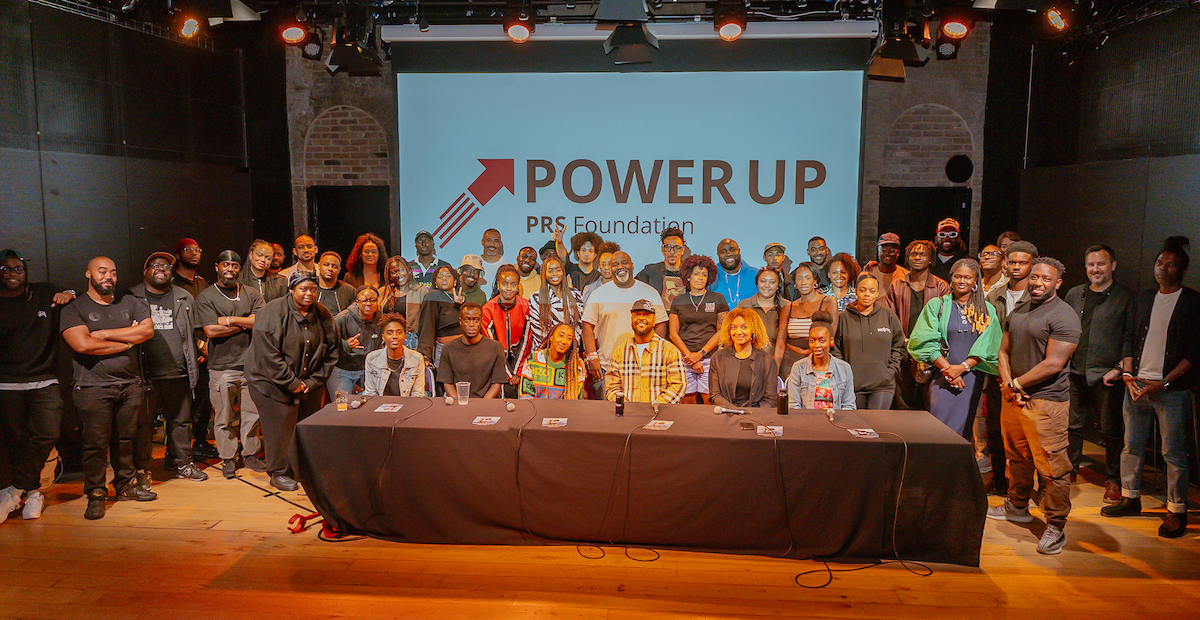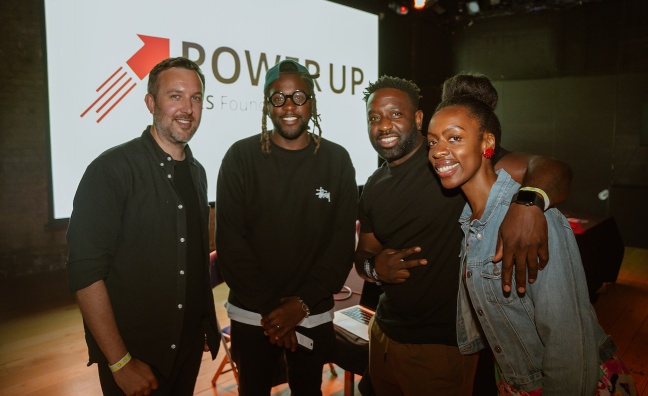Power Up unveiled its year three participants in the summer as part of a long-term initiative to elevate Black talent in the music industry.
Music Week followed up that announcement with a magazine interview with co-founder Ben Wynter and year one participant Eunice Obianagha - you can read that piece here.
The latest cohort of 22 industry professionals and 18 music creators gathered for a launch at the Roundhouse in July (pictured below).
The programme assists in the development of their careers as well as accelerating change across the industry. This includes grant support of up to £15,000 alongside capacity-building masterclasses, mentoring, coaching, mental health and wellbeing support, and access to added value support from partners and the peer network.
Power Up is managed by PRS Foundation in partnership with YouTube Music, Beggars Group, Spotify and the Black Music Coalition, along with additional support from other companies.
In 2022, Power Up was awarded the inaugural IMPALA Changemaker Award, recognising the scale and speed of impact being made while recommending partnerships and similar initiatives in the independent sectors across Europe.
Here, PRS Foundation CEO and Power Up co-founder Joe Frankland and Senior Power Up manager Yaw Owusu reflect on the success of the initiative, consider the global potential and urge the wider industry to back the programme…
How important is the long-term vision for the Power Up programme in order to make change?
Joe Frankland: “We were very deliberate, Ben and I, when we announced Power Up was happening, that it would be at least a 10-year programme based on this concept of having a long-term network for Black creatives in music. In terms of funding, PRS Foundation is proud to have contributed to that. But we also rely on the industry and industry partners in collaboration. So, as you've seen so far, there's over a dozen people who have put into the programme which helps, but for us to still be here for the rest of the 10-year period we need a lot more support from the sector as well.”
What do you need to see from the industry to keep Power Up’s progress going?
JF: “There’s definitely a message coming from applicants to the programme that lots of people made commitments in 2020, and they have not kept up with those commitments, they have not kept it going. So while companies mean well and went through real educational moments, post George Floyd and Blackout Tuesday, not enough of them are necessarily backing it up with real action. So we need a lot more support, but we're very proud of the network and collaboration so far.”
We need a lot more support, but we're very proud of the network and collaboration so far
Joe Frankland
Is there a concern that companies are cutting back in the uncertain economic climate, which affects support for projects like Power Up?
JF: “We’re in a really tough financial climate, but I think it's all about investment in exciting talent from any background, so it pays off. There are numerous studies out there that talk about how much this benefits companies and every staff member, no matter what their background. So companies owe it to themselves to start investing in initiatives, and investing in talent that’s coming through their own doors as well. It's been nothing but positive for everyone who’s been involved so far.”
Yaw Owusu: “It's a tough time. I understand because, when a tragedy happens or there's a massive moment in society, people and organisations tend to want to come up with a remedy. But this is not a sprint, it's a marathon. What we are trying to do is make sure we’re consistently building something that has real impact and value. But we also want the commitment of organisations that are in it for the long run to come and support this. We've created the perfect vehicle with Power Up to enable organisations to show their commitment, but also do what they're doing better. This is an opportunity to ask people to get behind something that is really having an impact and changing lives – and arguably changing the music industry.”

IMPALA suggested the Power Up model should be expanded across Europe. Is there an appetite for that? Can PRS Foundation export Power Up to help drive this agenda in other countries?
YO: “I think Power Up could work anywhere and it can work with different groups. I don't think it's limited to just working with Black music professionals and creatives. It can work anywhere because the way it's been built is on a system that’s being led by the people it's for, being authentic in the way it works, but also making it a part of everyone’s remit – for the organisations and individuals who want to support it to get involved. That's open source, and it can be developed anywhere. I think our full team would welcome that conversation. You've seen it with Keychange – Keychange has gone from a UK idea, to a Europe idea to something that’s in the US now. Power Up could do exactly the same thing – over the last three years we've proven its worth”
JF: “PRS Foundation itself is very experienced internationally. So while our focus is in the UK, we love other initiatives that we’re part of, such as Keychange. It's been really positive for the Keychange and the gender equity movement to learn from other countries, to see what it's like in Poland, Canada, and now in the US. Power Up has real potential to do similar things. We speak to other initiatives and other individuals abroad about there being a real need for what we're doing here in the UK. It has to be very authentically built, so it’s with the right people in the right places. Certainly some of the conversations we have with people in our networks in France, Italy and Germany, the language is different, the needs are different, but the core principle of investing in talent who have hit glass ceilings is needed.”
Is Power Up important in terms of developing talent in the UK regions too?
JF: “There are certainly issues across the whole of the UK and across all genres. But one of the fascinating learnings is, what is the glass ceiling for someone coming through their scene in Swansea? How does that compare with the Manchester scene, the Glasgow or London scene? Having a network of now 120 people means we’ve covered nearly every region, nearly every city and scene, and we learn a lot from each other. Some of the most inspiring stories are the people who are very underrepresented in their cities, towns or rural locations, but they’re now part of this UK-wide network and that benefits everyone. We've been very fortunate to bring in funding partnerships with Creative Scotland, Creative Wales, Arts Council of Wales, to be able to provide targeted [support].
“A great example is what Yaw has been doing with our partners in Wales, such as Andrew Ogun, who is agent for change at the Arts Council there, which is helping people in Wales to set up their own Welsh Black music action group. That is taking some of what we've learned outside of Wales, but really building something authentically with Black people in the Welsh creative sector. That’s what we want to do more of, and what we need more support to do.”
This is really having an impact and changing lives – and arguably changing the music industry
Yaw Owusu
YO: “If you're Black and working in the UK music industry, and you're in different parts of the country, you will face some of those barriers in a harsher way. You can still be just as great or creative, but those glass ceilings may actually feel like brick ceilings. The importance of Power Up, and the network specifically, means those barriers can be circumvented in a more meaningful way. If we can empower people in other cities across the UK to do great work and stay in their cities, then in those cities massive change can happen too. Because generally what you find is a lot of Black talent, whether industry professionals or music creators, they reach a point where, if they're not based in London, they have to move to London, which means in those cities the Black music ecology falls down. So what we're trying to do is make sure people can stay where they are, be great and make meaningful change. And if we do that enough over the 10-year period we’re looking at for Power Up, it's going to make an enormous difference to the way the UK looks at Black music, and the way Black music and the Black music community works in the UK.”
Have you been encouraged by the increasing moves to support the industry outside of London?
YO: “To me, it's essential. If you look at America, it's not just New York that has a music scene and that has influence. There's no reason why the music industry can't start looking at [Birmingham, Liverpool and Leeds] and support what's there because there’s loads of great stuff. So you don't have to restart it, it’s kind of tapping into it. It makes economic sense for a lot of these London-based companies in terms of it being cheaper outside of London. A lot of city councils and grassroots organisations are willing to come on board. Power Up is showing that if you take a nationwide approach to the problem, you can have a massive impact and provide a solution.”
MAIN PHOTO: (L-R) Joe Frankland, Yaw Owusu, Ben Wynter, Eunice Obianagha










